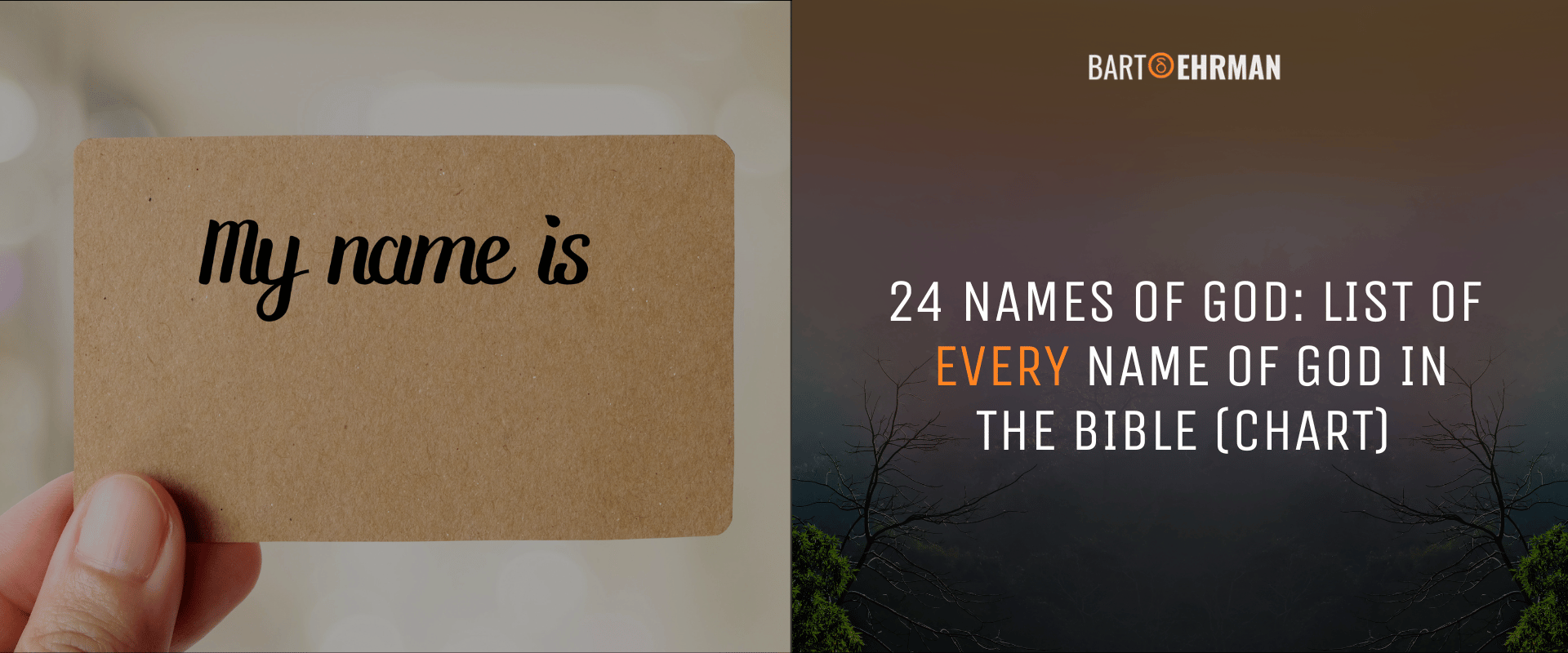24 Names of God: List of Every Name of God in the Bible (CHART)

Written by Joshua Schachterle, Ph.D
Author | Professor | Scholar
Author | Professor | BE Contributor
Verified! See our editorial guidelines
Verified! See our guidelines
Edited by Laura Robinson, Ph.D.
Date written: December 23rd, 2024
Disclaimer: The views and opinions expressed in this article belong to the author and do not necessarily match my own. - Dr. Bart D. Ehrman
In the Bible, the names of God are not just titles but instead reveal deep theological beliefs about God’s character, nature, and relationship with humanity. Throughout both the Old and New Testaments, various names for God are used to highlight specific attributes.
This article explores 24 significant names of God in the Bible and their meanings, as well as scriptural references. By understanding the many names of God, we can understand ancient people’s views of God's multifaceted nature.

NAMES OF GOD IN THE OLD TESTAMENT / HEBREW BIBLE
Name of God | Meaning in English | Verses |
|---|---|---|
El Shaddai | God Almighty | Genesis 17:1, Genesis 28:3, Genesis 35:11 |
’Eh·yeh | I Am | Exodus 3:14 |
El Elyon | The Most High God | Psalm 57:2, Genesis 14:18, Psalm 78:35 |
Adonai | Lord | Genesis 15:2, Exodus 4:10, Joshua 7:8 |
YHWH | He Who Is | Genesis 2:4, Genesis 2:21, Deuteronomy 6:2 |
YHWH Nissi | The Lord Is My Banner | Exodus 17:15 |
YHWH Raah | The Lord My Shepherd | Psalm 23:1, Genesis 49:24, Psalm 80:1 |
YHWH Rapha | The Lord Who Heals | Exodus 15:26 |
YHWH Shammah | The Lord Is There | Ezekiel 48:35 |
YHWH Tsidkenu | The Lord Our Righteousness | Jeremiah 23:6, Jeremiah 33:16 |
YHWH Mekoddishkem | The Lord Who Sanctifies (or sets apart) | Exodus 31:13, Leviticus 20:8 |
El Olam | God the Eternal | Genesis 21:33, Jeremiah 10:10, Isaiah 26:4 |
Elohim | God | Genesis 1:1, Exodus 3:12, Deuteronomy 7:9 |
Qanna | Jealous God | Exodus 20:5, Exodus 34:14, Deuteronomy 5:9 |
YHWH Jireh | The Lord Will Provide | Genesis 22:14 |
YHWH Shalom | The Lord Is Peace | Judges 6:24 |
YHWH Sabaoth | Lord of Hosts or Lord of the Powers | Jeremiah 9:15, 1 Samuel 1:3, Malachi 1:6 |
Looking at all the different names of God, you’ll notice that most of them begin with either El or YHWH. El was originally the name of the supreme god of the Canaanites, some of whom became the Israelites later. Once the Israelites separated themselves as a people, some continued to call their own supreme deity El.
YHWH, on the other hand, is a set of four consonants in Hebrew (Yod, He, Waw, He) often called the tetragrammaton, Greek for “four letters,” and is the most common name of God in the Hebrew Bible, occurring 5,410 times. At the time the name first appeared, Hebrew had no written vowels. Instead, those who could read and write the language simply knew which vowel sounds occurred in the relation between certain consonants.
In his commentary on the Hebrew Bible, Robert Alter argues that the original pronunciation of the tetragrammaton would have been “YAH-way.” However, there is no perfect scholarly consensus on this pronunciation. In The Invention of God, Thomas Römer claims people would have pronounced the Tetragrammaton as 'Yahô' or 'Yahû.
(Affiliate Disclaimer: We may earn commissions on products you purchase through this page at no additional cost to you. Thank you for supporting our site!)
However, Max Reisel argues in The Mysterious Name of Y.H.W.H that YHWH would instead have been pronounced YeHūàH. In addition, some Christian groups, starting in the Middle Ages, pronounced the name as “Jehovah,” a pronunciation that some, like Jehovah’s Witnesses, continue to this day. As far as I’m aware, no biblical scholar agrees that this is the correct pronunciation of the tetragrammaton.
Another interesting point about the tetragrammaton is that Jews are forbidden to pronounce it out of reverence, a practice that goes back centuries. When reading biblical passages in which YHWH is written, the most common practice is to substitute either the word Adonai, the Hebrew word for Lord or Master, or HaShem meaning simply “the name.”
Technically, Elohim is the plural of El and would thus mean “gods.” However, it is clear in the Old Testament that despite its grammatical plurality, the word is meant to signify a singular God since it’s used with singular verbs and adjectives.
Another interesting divine name is I Am, found only in Exodus 3:14. In this verse, after Moses has asked God’s name, God says “I am what I am (other translations say “I will be what I will be).” He then tells Moses to tell the Israelites “I am has sent me.” This could be understood as signifying that God is being itself, a metaphysical interpretation that both Augustine of Hippo and Thomas Aquinas derived from the name.
Qanna, Jealous God, is used by God himself in Exodus to command the Israelites not to worship any of the other gods which exist. This demonstrates, by the way, that the earliest parts of the Old Testament are not monotheistic, meaning that only one God exists, but henotheistic, meaning that although many gods exist, our God is the greatest.
Many of the YHWH names above are given to sacred places or things in the Old Testament. For example, YHWH Shalom, God is Peace, is given as a name to an altar made by Gideon in the book of Judges. YHWH Jireh, the Lord Provides, is given to Mount Moriah by Abraham after God intervenes to prevent the sacrifice of Isaac and YHWH Shammah, The Lord Is There, is a symbolic name given to Jerusalem in the book of Ezekiel to indicate God’s presence in the holy city.
When the Hebrew Bible was translated into a Greek version called the Septuagint, the word YHWH was most often translated as Kyrios, the Greek word for Lord or Master. Interestingly, the Hebrew name YHWH never appears in the New Testament. This makes sense, though, because the New Testament authors read the Septuagint rather than the original Hebrew version of the Old Testament, and would thus have used the Greek word themselves in their writings.
Speaking of the New Testament, let’s look now at the names of God and their meaning, which changes depending on the verse.
NAMES OF GOD IN THE NEW TESTAMENT
Name of God | Meaning in English | Verses |
|---|---|---|
Theos | God | Mark 2:7, John 20:28, Romans 15:6 |
Kyrios | Lord | Matthew 2:19, Mark 11:3, Acts 9:11 |
Pater | Father | Matthew 5:45, Mark 14:36, John 10:32 |
Ho Theos Abraam, kai ho Theos Isaak, kai ho Theos Iakob | God of Abraham, Isaac and Jacob | Mark 12:26, Acts 3:13, Matthew 22:32 |
Pantokrator | Almighty | 2 Corinthians 6:18, Revelation 1:8, Revelation 15:3 |
To Alpha kai To Omega | The Alpha and the Omega | Revelation 1:8, Revelation 21:6, |
Ho Hosios | The Holy One | Revelation 16:5, Acts 2:27, 1 John 2:20 |
Theos is by far the most common name for God in the New Testament, occurring 1,318 times. This makes sense since we know the authors of the New Testament were reading the Septuagint, where the Hebrew name Elohim had been translated into Theos. As such, the New Testament authors most often used this term to refer to God the Father.
The word Kyrios is also used to refer to God the Father but also refers often to Jesus. Like the Hebrew word Adonai, Kyrios can simply mean lord or master over anyone, a problem solved in the English version by capitalizing Lord when it refers to the divine.
Pater or Father seems to be Jesus’ preferred designation for God. In Harper's Bible Dictionary, it says that many ancient civilizations called their supreme gods father. This includes the ancient Greeks who called Zeus their father, as well as many near-eastern civilizations adjacent to the ancient Israelites. In the New Testament, the word Father also reinforces, of course, the notion that Jesus is God’s son.
When God is called “the God of Abraham, Isaac, and Jacob” in the New Testament, it is a conscious effort to emphasize that the God of Jesus is the same God who intervened in the history of the Israelites.
Pantokrator, literally “ruler over all,” is used mostly in the book of Revelation. This makes sense since Revelation is about God’s vindication of Christians despite the seemingly all-powerful rule of Rome. In the Septuagint, it is used as a translation of the Hebrew El Shaddai.
Alpha and Omega are the first and last letters of the Greek alphabet. As such, they signify the first and the last as a designation for God. This is made clear in Revelation 22:13 when Jesus claims the title for himself, adding that he is “The first and the last, the beginning and the end.” As a divine name, it emphasizes the eternality of God who existed before everything else and will exist after everything else has passed away, according to Revelation.
Ho Hosios or The Holy One refers to God the Father explicitly only once (Rev 16:5). It refers to Jesus several times (Mark 1:24; Luke 4:34; and John 6:69) and could refer to either God or Jesus in 1 John 2:20.

Conclusion
There are many names of God in the Bible. In the ancient near-east, gods were always named and never simply called “god.” The Israelites of the Hebrew Bible inherited some of the names for their God from other near-eastern civilizations such as the Canaanites (El). Other names attributed characteristics to God such as peace, strength, everlastingness, and power.
The names for God in the New Testament weren’t nearly as prolific. The generic Greek word theos simply meant “God” and was the name used most often for the divine. Other names indicated how Christians and Jews viewed God — as a Father, as a ruler, as holy.
FREE COURSE!
WHY I AM NOT A CHRISTIAN
Raw, honest, and enlightening. Bart's story of why he deconverted from the Christian faith.
Over 6,000 enrolled!

